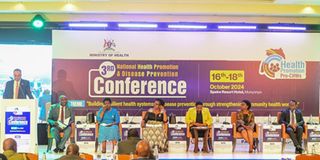Community health transformation requires continued momentum

Prime Minister Robinah Nabbanja (3rd R) and officials from the Ministry of Health during the conference on 16, 2024. PHOTOI/ COURTESY
What you need to know:
- One critical step forward is the government’s commitment to creating a unified approach: one plan, one budget, and one monitoring and evaluation framework for CHWs.
Last month, the Ministry of Health, with support from partners, organised the 3rd Health Promotion and Disease Prevention Conference. One of the noteworthy gains was the government’s pledge to increase domestic funding for community health worker (CHW) remuneration to Shs2 billion in the subsequent financial years.
Additionally, 3.6 percent of the health budget will be earmarked for community health. This is a monumental shift that acknowledges the critical role CHWs play in delivering primary healthcare services, especially in underserved areas. These commitments, if implemented, have the potential to change the landscape of healthcare delivery in Uganda.
However, we must also recognise that the road ahead requires continued momentum. Uganda’s community health workforce is the backbone of our health system, and the recent pledges are just the beginning of what must be a comprehensive and sustained effort to support them. In my view, one of the most pressing needs is to reduce the duplication of resources and efforts.
We need better coordination among partners and more transparent use of data to inform decision-making. Additionally, it is important to ring-fence domestic resources for community health, ensuring that these investments are sustainable and targeted toward long-term solutions. A strategic digital and data-driven approach will help us track progress and measure the return on investment in community health work.
During the conference, Dr Jane Ruth Aceng, the minister of Health, rightly pointed out that the success of our health system hinges on the support given to community health workers. But to ensure that success, CHWs need more than verbal recognition—they need to be adequately compensated, trained, equipped, and offered career growth opportunities.
One critical step forward is the government’s commitment to creating a unified approach: one plan, one budget, and one monitoring and evaluation framework for CHWs. This is a crucial move toward harmonising the fragmented efforts that often lead to inefficiencies. It will ensure that resources are directed where they are most needed, and that CHWs are fully supported to do their work effectively. Yet, while this unified approach is promising, we must not stop there.
As a country, we need to build and institutionalise a resilient health system that can withstand the challenges of tomorrow, including new health threats and disease outbreaks. This means investing in health worker training, and ensuring they have the necessary tools and resources to serve their communities.
CHWs should not be left to work in isolation. We need stronger referral systems, improved supply chains, and the integration of younger populations into community-based work to build a future-ready workforce. Living Goods has been working to support these efforts and is proud to have been part of the discussions and commitments made during this gathering.
Through initiatives like Project BIRCH funded by Global Fund through Africa Frontline First, we are supporting the Ministry of Health in mapping resources, improving digital health systems, and creating the foundational structures needed to scale up Uganda’s community health programme. We are pleased that the government is spearheading these efforts, complementing them with a well-defined strategy for resource allocation. This way, all stakeholder investments will be harmonised to create a health system that truly serves its people.
Christine Namayanja, Country Director, Living Goods Uganda.




